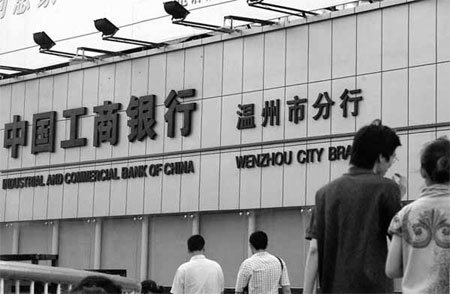Investors turn conservative
Updated: 2013-08-08 06:38
By Yu Ran in Wenzhou, Zhejiang (China Daily)
|
||||||||
|
The total balance of yuan deposits at banks in Wenzhou exceeded 393 billion yuan ($64.2 billion) at the end of June as residents put their savings into banks instead of high-risk financial products. Yonhap News Agency via Reuters |
Wenzhou residents now prefer safer returns over high-risk products
The majority of investors in Wenzhou, in Zhejiang province, are changing their attitude to investment by buying principal-guaranteed financial products from banks instead of other higher-risk items such as stocks or property.
Having suffered a credit crisis in the city since the end of 2011, when many residents lost savings they had put into underground banks that offered high-interest returns, Wenzhou people have gradually turned from brave investors to conservative savers.
Total deposits at banks in the city increased this year. The balance of yuan deposits reached a peak exceeding 393 billion yuan ($64.2 billion) at the end of June, increasing more than 56.1 billion yuan for the first half of the year. The figure was 394 million yuan higher than the amount for the previous entire year, according to statistics from the Wenzhou branch of the People's Bank of China.
Among those savings, the fixed deposits from enterprises were more than 9.1 billion yuan and the amount of money in individuals' fixed saving accounts was in excess of 22.7 billion yuan. The savings deposits for the year's first half in the city increased by more than 29.2 billion yuan.
"More people chose to put money in fixed saving accounts such as the seven-day notice account with an annual interest of 1.35 percent for long-term investments," said Huang Yingying, a financial manager at an ICBC branch in Wenzhou.
Huang added the best sellers of financial products in the branch for the past half year were principal-guaranteed short-term financial products with an annual return rate of 6 to 6.5 percent on average.
Clients seem to be much more conservative and cautious when investing in high-risk financial products since the emergence of the credit crisis in the city.
At the same time, the willingness of local residents to invest in the stock market, funds and property market declined, with a sharp drop in turnover.
In the first half of the year, total investment in the stock market from the city was more than 401 billion yuan, 18.4 percent lower than the previous year.
"Stock market-related financial products are no longer able to attract the attention of investors, who have turned from greedy profit makers to wise money savers over the past two years," said Huang.
Huang added most banks in the city had tried to attract more investors by introducing at least one principal-guaranteed financial product with acceptable returns to meet the changed demands of clients.
In the property market, the growth of loans for real estate development decreased 160 million yuan while the increase in loans taken by property buyers was more than 1.6 billion yuan less than the previous year.
"Home prices in Wenzhou are expected to continue to decrease slowly because the bubble became too big over the past three years and investors' confidence weakened significantly," said Yao Rulin, general manager of Faith-Trust Real Estate Development Co Ltd, which runs three residential projects in Wenzhou as well as commercial properties.
The current average sale price of Faith-Trust residences is about 40,000 yuan to 45,000 yuan a square meter. It was more than 60,000 yuan in 2010 when home prices reached their peak.
(China Daily USA 08/08/2013 page14)
Most Viewed
Editor's Picks

|

|

|

|

|

|
Today's Top News
China's innovation prowess looms large
US, EU concerned about stalemate in Egypt
EU to continue anti-subsidy solar probe
Nation poised to import more GMO products
Illegal Shanghai stay costs foreigner 10,000 yuan
China to be leading business travel market
Cards make paying global tuition easier
Probes not targeting foreign brands
US Weekly

|

|













